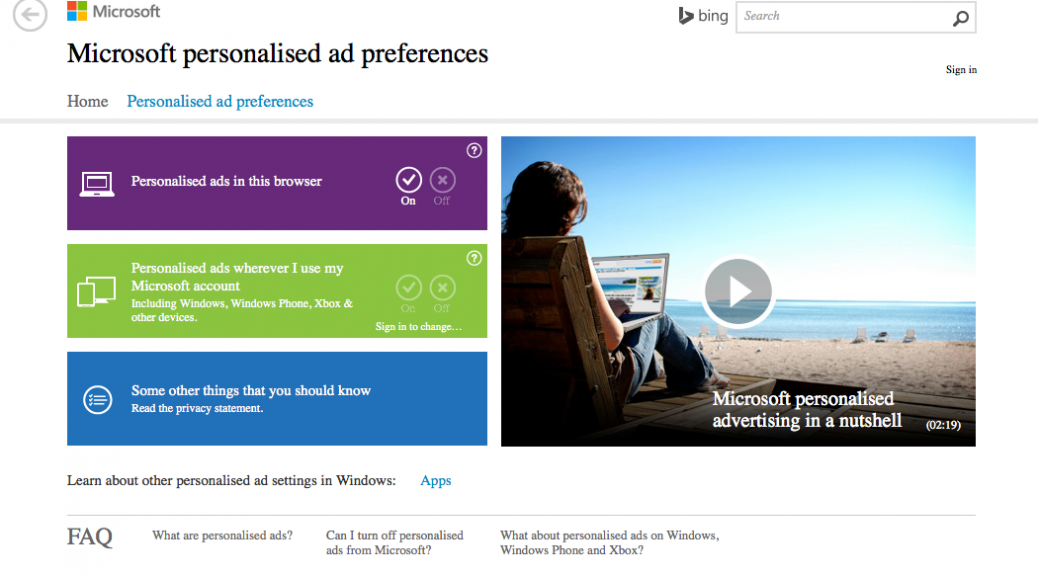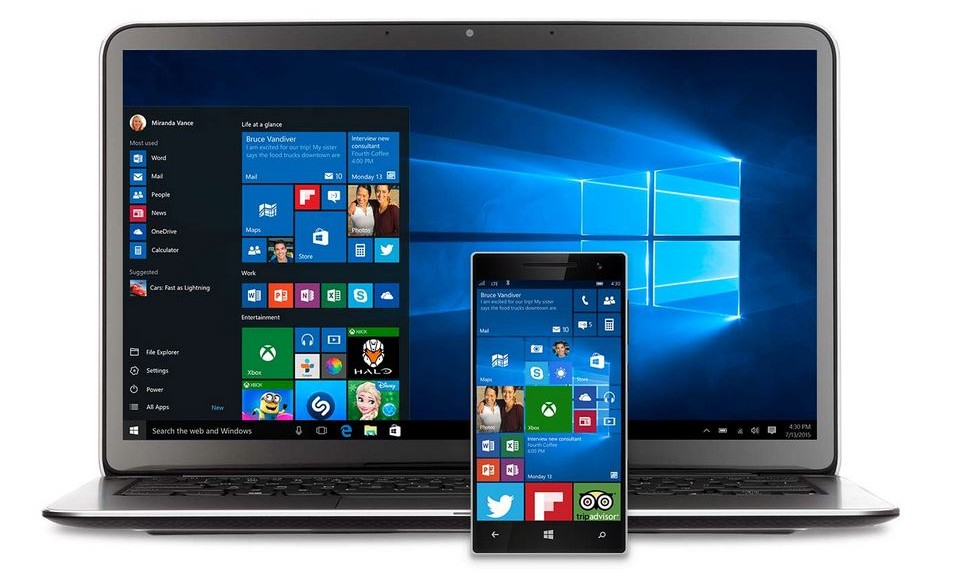The list of politicians in Washington wringing their hands over the increasing use of encryption by consumers and businesses is growing longer by the day. Sen. Elizabeth Warren added her name to that list on Monday. Warren (D-Mass.) sent a letter to Attorney General Loretta Lynch expressing concern about a new encrypted communications platform that […]
Tag Archives: Privacy
Carphone Warehouse reports massive data breach
Bad news if you are a customer of Carphone Warehouse, a leading UK retailer for mobile phones and call plans. Late last week, the company announced that it had suffered a large data breach affecting as many as 2.4 million customers.
The information leaked includes names, addresses, dates of birth and bank details. While as many as 90,000 encrypted credit card details were also stolen.
In a statement, Sebastian James, group chief executive of Dixons Carphone, said:
“We take the security of customer data extremely seriously, and we are very sorry that people have been affected by this attack on our systems.
“We are, of course, informing anyone that may have been affected, and have put in place additional security measures.”
“We took immediate action to secure these systems and launched an investigation with a leading cyber security firm to determine exactly what data was affected.”
If you think that you are potentially affected by this hack, here are two things that you should do as soon as possible to help mitigate any risk posed by unauthorized access to your bank accounts or credit cards.
Suspend your credit card
Naturally, one of the first things you should do is contact your credit card issuer and suspend your card. This means that you’re no longer vulnerable to credit card fraud if the card number has been stolen.
Your bank will issue a new credit card with a new number that wasn’t compromised in a breach.
Set up ID monitoring
I also highly recommend registering with an ID monitoring service. These scour the web searching for your credentials whenever and wherever they pop up. This allows you to take preemptive action against potential scammers.
There are instances of this being offered to data breach victims for free. Target did just that last year after their large hack. Should Carphone Warehouse contact you to say you’re information has been leaked, you should ask them about a similar service.
Beware of more scams
A word of caution, we’re likely to see some phishing attempts from fraudsters offering remedial services for data breach victims. Be very cautious about any email that arrives talking about compensation or other enticing services. Double check that any correspondence you receive is directly from Carphone Warehouse. If in doubt, contact them directly yourself rather than opening a suspicious email.
![]()
![]()
Glasses that ‘block’ facial recognition technology to launch in 2016
Glasses that are capable of blocking facial recognition technology are to go on sale in Japan next year.
The post Glasses that ‘block’ facial recognition technology to launch in 2016 appeared first on We Live Security.
![]()
Privacy Badger 1.0 Released With Support For EFF Do Not Track Policy
The EFF has released the 1.0 version of Privacy Badger, its browser extension that blocks the hidden trackers used on many sites to follow users around the Web.
Four Quick Windows 10 Privacy Fixes
If you’re upgrading from a previous version of Windows or buying a new Windows 10 device (PC, laptop or tablet), then you’ll want to be aware of a few privacy issues surrounding some of the new Windows 10 features.
These four quick tips can help you rest easy knowing you’ve got more control over your data.
Disable Personalised Ads
In order to serve you more appropriate ads, Windows 10 tracks some of your behavior so that they can better understand your likes and dislikes.
If you don’t want this feature, you can visit this link https://choice.microsoft.com/en-gb/opt-out on your Windows machine to disable Personalised Ads in your Windows Edge browser and wherever they use your Microsoft Account. This will prevent Windows from showing personalised ads and collecting your data across multiple devices.
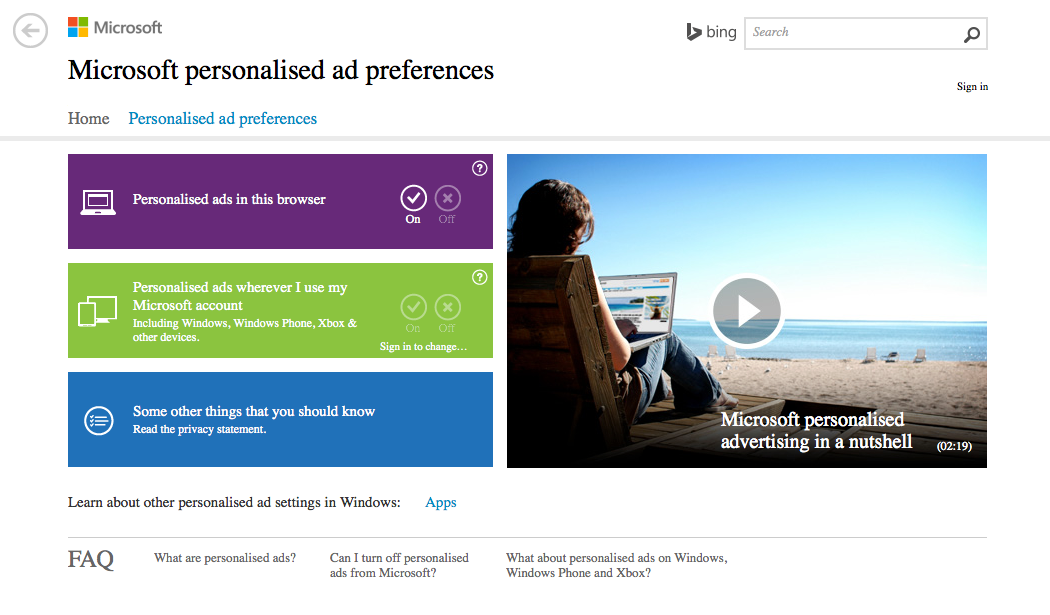
Disable Advertiser ID
To prevent third parties from advertising and collecting your data gathered within Windows from Apps you can disable the Advertiser ID.
To do this go to ‘Start menu’, open ‘Settings’, choose the ‘Privacy’ option, then select the ‘General’ tab and turn off the 1st option at the top of the list.
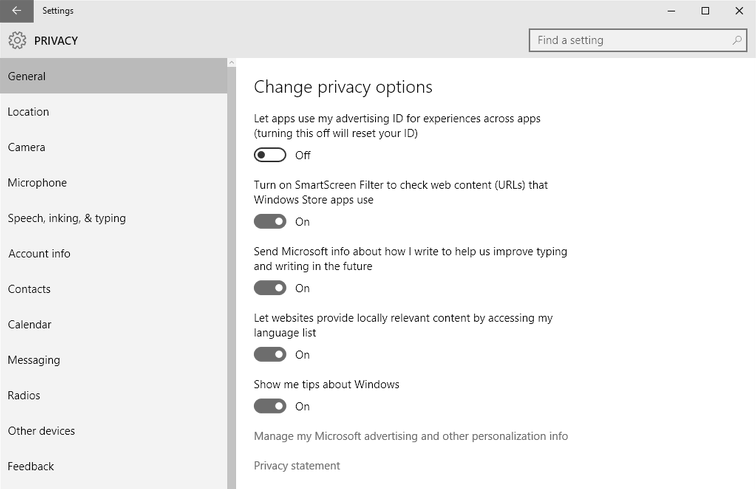
Disable Wi-Fi Sense
Windows 10 Wi-Fi Sense essentially wants to help you maintain online connectivity on the go, and help you use less mobile data if you’re on a mobile device.
It does this by crowdsourcing networks with other Windows users. It looks for open networks (unsecured or password free networks) and scans your contacts (Outlook Contacts, Skype Contacts and Facebook friends) networks and lets you share Wi-Fi . I
This has some great advantages like not having worry about managing network access, but it does present some issues:
- People you barely know could connect to your Wi-Fi network.
- Any questionable activity on your Wi-Fi internet connection could result in you taking responsibility. This means that you have to trust that people accessing and using your connection are doing the right thing.
- Your Internet connection could suffer significant slowdowns and increased data usage.
- Open Wi-Fi networks are insecure, and some are setup specifically for nefarious purposes – a hacker can intercept data via packet sniffing or use a man-in-the-middle attack. You might not know if you’ve connected to one automatically and as such are at risk.
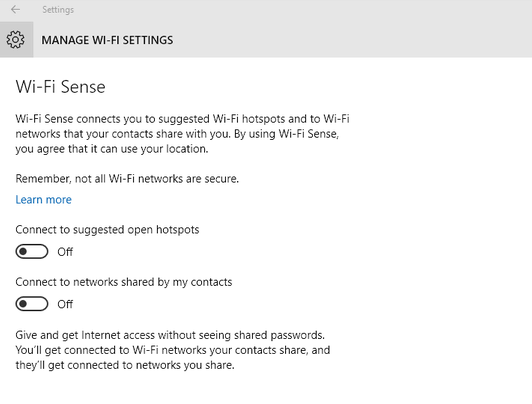
If you want to disable the Wi-Fi Sense sharing option then open the Start menu > Settings, Choose the ‘Network & Internet’ option Then click ‘Manage Wi-Fi settings’, and then disable all the options on this page.
Disable location services
If you don’t like the idea of Windows 10 or its apps tracking your movement, then you’ll want to disable location tracking. Open the Start menu, click Settings and choose the ‘Privacy’ option, then select the ‘Location’ tab
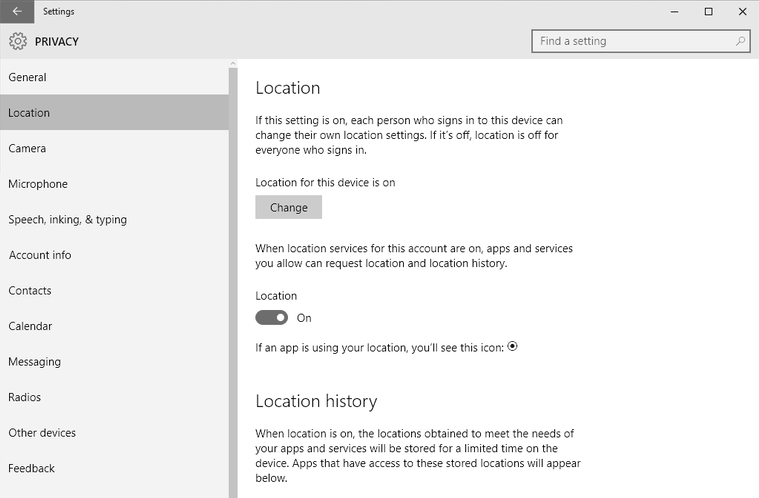
You can disable the location services globally or you choose which apps can track location.
We’ve only covered the basics here, but there are additional options available in the Windows 10 privacy settings that you might want to take a look at and customise further, especially if you’re concerned about your privacy.
To go that extra mile and ensure your complete privacy while online, then you can use a Virtual Private Network (VPN) service like hidemyass.com which encrypts your data.
If you would like to chat more about privacy, then please start a conversation with us on Facebook or Twitter. We’d love to hear from you and any tips you might like to share.
![]()
![]()
Windows 10, Privacy 0? ESET deep dives into the privacy of Microsoft’s new OS
Windows 10 offers more personalisation and integration than ever before. We take a look at the privacy implications of this.
The post Windows 10, Privacy 0? ESET deep dives into the privacy of Microsoft’s new OS appeared first on We Live Security.
![]()
Government Asks for Security Community’s Help on Technical Issues
LAS VEGAS–Washington is looking for a few good hackers. Politicians and policymakers in the United States generally are not thought of as being the most technically savvy lot. It’s a reputation that’s well-earned in some cases, with some politicians boasting about their inability to use email and affinity for flip phones. But the lack of understanding […]
Granick: Dream of Internet Freedom ‘Dying’
Black Hat keynoter Jennifer Granick imagined a day when a regulated Internet looks like a lot like television.
Windows 10 Service Agreement upsetting privacy watchdogs
Targeted advertisements based on your search history, location tracking, Wi-Fi sharing, torrent style updates – features that share too much are getting privacy watchdogs in a tizzy.
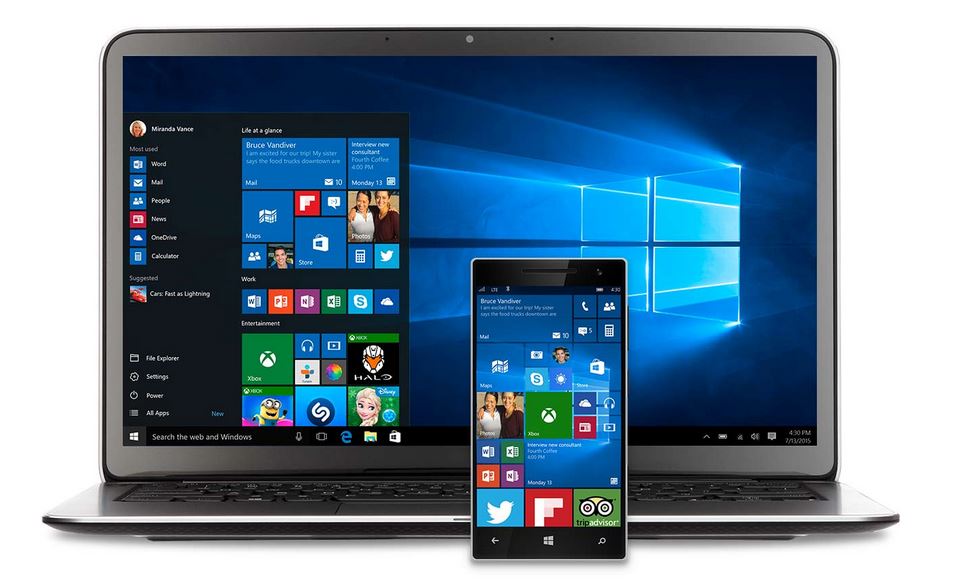
image via Microsoft
Reviewers and consumers alike are happy about the new Windows 10, but now that there has been time to read through the 45-page long consolidation of Service Agreements into one central agreement (which also covers Bing, Outlook, and Xbox Live) some data protection advocates are taking issue with certain features. The European Digital Rights (EDRi) organization summarized that “Microsoft basically grants itself very broad rights to collect everything you do, say and write with and on your devices in order to sell more targeted advertising or to sell your data to third parties.”
Sharing your business to keep yourself organized

Anyone remember this assistant?
One of the useful but controversial features in Windows 10 is a personal digital assistant called Cortana, similar to Apple’s Siri (and light years away from Clippit, Windows 95 office assistant!) Cortana can set reminders, recognize your natural voice, use information from Bing to answer questions, and of course save all that information in order to provide personalized search results, which basically means you are being profiled so targeted ads can be presented to you (Facebook and Google does that too). Cortana can be disabled and you can opt out of personalized ads.
Sharing your Wi-Fi with trusted friends
Wi-Fi Sense is a feature of Windows 10 that lets you give access to your Wi-Fi network to your friends without sharing your password. It’s designed to make it easier to use a friend’s or business’s wireless network. You and your friend must enable Wi-Fi Sense (Outlook and Skype contacts are authenticated by default, but you must allow your Facebook friends access) and you must choose which network to share.
It is actually safer than it sounds, because your friends can use your internet without getting access to your personal files and folders. Wi-Fi Sense maintains the encryption of your network so hackers or freeloaders cannot use it – or at least that’s the way it should work. If history repeats itself, and we know it does, then hackers will eventually find a way around that. You can disable and block Wi-Fi Sense.
Sharing (or is it stealing?!) your bandwidth
In order to prevent hacking and viruses, Windows 10 automatically downloads and installs security patches and updates using a torrent- style peer-to-peer delivery system called Windows Update Delivery Optimization (WUDO). Instead of having to handle huge update files, each person distributes a small portion of the files across multiple computers, thereby making the update download quicker. The feature is enabled by default in the Home and Pro edition.
All that sharing sounds good, but the way it works may be inconvenient for those who have limited bandwidth or those who think of it as stealing rather than sharing. You can disable Windows Update Delivery Optimization.
Sharing your data with the law
One particular excerpt from the privacy policy states that Microsoft can “access, disclose and preserve personal data, including your content (such as the content of your emails, other private communications or files in private folders), when we have a good faith belief that doing so is necessary to protect our customers or enforce the terms governing the use of the services.”
What this means is that Microsoft can share information if required by law or in response to law enforcement or other government agency requests. This does not seem too different from the way Google or other companies handle civil and law enforcement requests for user data.
Read the Microsoft Service Agreement and Privacy Statement.
Follow Avast on Facebook, Twitter, YouTube, and Google+ where we keep you updated on cybersecurity news every day.
![]()
San Jose Library Takes a Leading Role in Privacy Literacy
Online child safety issues are only getting more crucial as the average age for children online keeps dipping lower and lower. In many ways this is a good thing: There are great educational possibilities and it connects young minds to a bigger, wider world. But we know there are many pitfalls.
As my colleague Tony Anscombe recently noted during the Child Internet Safety Summit 2015, all too often people don’t think about digital safety in the same terms as the overall safety of our kids – or begin their education about it as soon as we would, say, street safety. But the best time to start teaching children about Internet safety, literally, is as soon as you let them start using it.
In that vein, I was excited to hear about an online project developed by the Public Library in San Jose California that is designed to help people of all ages understand privacy issues: The Privacy Literacy project. The program is developing online tools that will help people understand digital privacy and make more informed decisions about their online activities.
What better place for families to learn and find tools about digital safety than your local library?
The program was awarded a $35,000 grant earlier this year by the prestigious Knight Foundation and it began prototype testing of its new privacy tool in June.
In an ingenious move, the San Jose library partnered with game developers at San Jose State University’s Game Development Club to create its working prototype.
The result of the collaboration between the gamers and the library is a simple video-game that might remind you (if you’re of a certain age) of Pac-Man. Users follow multiple levels and collect tools as they learn more about privacy and negotiating the online world. The prototype was featured this last June at the American Library Association’s annual conference, held in San Francisco.
“Security, privacy – it’s a scary topic for a lot of people,” project lead Erin Berman told San Jose’s Metro newspaper. “So what I wanted to do was create a way to make it fun.”
As we all know, a tool that makes this process fun is bound to have a greater chance of success!
I should mention that this tool would certainly not be limited to children. For example, many older people without digital access of their own increasingly use tablets and laptops at libraries (just look around at your local library sometime). And many of these people are applying for jobs or aid through these digital devices, often sharing sensitive information. This is a great way to educate these groups at literally the point of entry.
In everything we do, from our products to our Smart User program in support of the Clinton Global Initiative to our Magda and Mo series for children and the many articles we provide for families, AVG advocates online safety. And we applaud all efforts that help educate users about digital security. It is especially encouraging to see libraries become engaged in privacy literacy given their background and relationships to the community.
![]()
![]()
